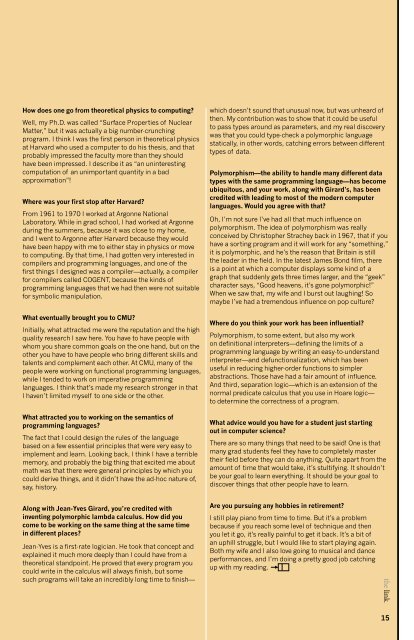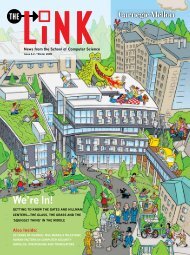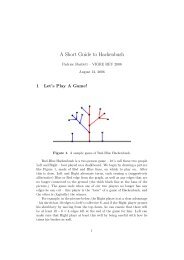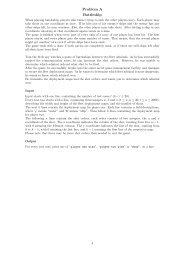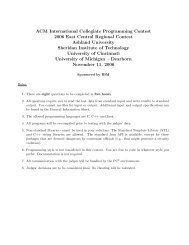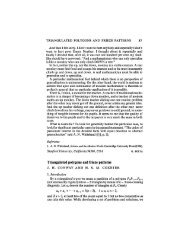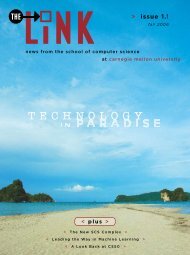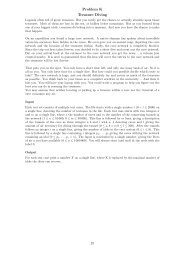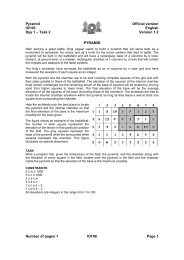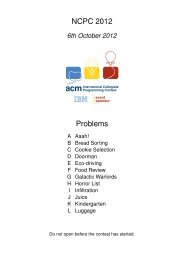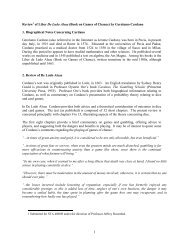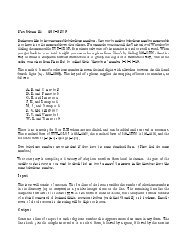Download now (1.3MB, PDF reader required) - Link home page
Download now (1.3MB, PDF reader required) - Link home page
Download now (1.3MB, PDF reader required) - Link home page
You also want an ePaper? Increase the reach of your titles
YUMPU automatically turns print PDFs into web optimized ePapers that Google loves.
how does one go from theoretical physics to computing<br />
Well, my Ph.D. was called “Surface Properties of Nuclear<br />
Matter,” but it was actually a big number-crunching<br />
program. I think I was the first person in theoretical physics<br />
at Harvard who used a computer to do his thesis, and that<br />
probably impressed the faculty more than they should<br />
have been impressed. I describe it as “an uninteresting<br />
computation of an unimportant quantity in a bad<br />
approximation”!<br />
Where was your first stop after harvard<br />
From 1961 to 1970 I worked at Argonne National<br />
Laboratory. While in grad school, I had worked at Argonne<br />
during the summers, because it was close to my <strong>home</strong>,<br />
and I went to Argonne after Harvard because they would<br />
have been happy with me to either stay in physics or move<br />
to computing. By that time, I had gotten very interested in<br />
compilers and programming languages, and one of the<br />
first things I designed was a compiler—actually, a compiler<br />
for compilers called COGENT, because the kinds of<br />
programming languages that we had then were not suitable<br />
for symbolic manipulation.<br />
What eventually brought you to cmu<br />
Initially, what attracted me were the reputation and the high<br />
quality research I saw here. You have to have people with<br />
whom you share common goals on the one hand, but on the<br />
other you have to have people who bring different skills and<br />
talents and complement each other. At CMU, many of the<br />
people were working on functional programming languages,<br />
while I tended to work on imperative programming<br />
languages. I think that’s made my research stronger in that<br />
I haven’t limited myself to one side or the other.<br />
What attracted you to working on the semantics of<br />
programming languages<br />
The fact that I could design the rules of the language<br />
based on a few essential principles that were very easy to<br />
implement and learn. Looking back, I think I have a terrible<br />
memory, and probably the big thing that excited me about<br />
math was that there were general principles by which you<br />
could derive things, and it didn’t have the ad-hoc nature of,<br />
say, history.<br />
which doesn’t sound that unusual <strong>now</strong>, but was unheard of<br />
then. My contribution was to show that it could be useful<br />
to pass types around as parameters, and my real discovery<br />
was that you could type-check a polymorphic language<br />
statically, in other words, catching errors between different<br />
types of data.<br />
polymorphism—the ability to handle many different data<br />
types with the same programming language—has become<br />
ubiquitous, and your work, along with girard’s, has been<br />
credited with leading to most of the modern computer<br />
languages. Would you agree with that<br />
Oh, I’m not sure I’ve had all that much influence on<br />
polymorphism. The idea of polymorphism was really<br />
conceived by Christopher Strachey back in 1967, that if you<br />
have a sorting program and it will work for any “something,”<br />
it is polymorphic, and he’s the reason that Britain is still<br />
the leader in the field. In the latest James Bond film, there<br />
is a point at which a computer displays some kind of a<br />
graph that suddenly gets three times larger, and the “geek”<br />
character says, “Good heavens, it’s gone polymorphic!”<br />
When we saw that, my wife and I burst out laughing! So<br />
maybe I’ve had a tremendous influence on pop culture<br />
Where do you think your work has been influential<br />
Polymorphism, to some extent, but also my work<br />
on definitional interpreters—defining the limits of a<br />
programming language by writing an easy-to-understand<br />
interpreter—and defunctionalization, which has been<br />
useful in reducing higher-order functions to simpler<br />
abstractions. Those have had a fair amount of influence.<br />
And third, separation logic—which is an extension of the<br />
normal predicate calculus that you use in Hoare logic—<br />
to determine the correctness of a program.<br />
What advice would you have for a student just starting<br />
out in computer science<br />
There are so many things that need to be said! One is that<br />
many grad students feel they have to completely master<br />
their field before they can do anything. Quite apart from the<br />
amount of time that would take, it’s stultifying. It shouldn’t<br />
be your goal to learn everything. It should be your goal to<br />
discover things that other people have to learn.<br />
along with Jean-yves girard, you’re credited with<br />
inventing polymorphic lambda calculus. how did you<br />
come to be working on the same thing at the same time<br />
in different places<br />
Jean-Yves is a first-rate logician. He took that concept and<br />
explained it much more deeply than I could have from a<br />
theoretical standpoint. He proved that every program you<br />
could write in the calculus will always finish, but some<br />
such programs will take an incredibly long time to finish—<br />
are you pursuing any hobbies in retirement<br />
I still play piano from time to time. But it’s a problem<br />
because if you reach some level of technique and then<br />
you let it go, it’s really painful to get it back. It’s a bit of<br />
an uphill struggle, but I would like to start playing again.<br />
Both my wife and I also love going to musical and dance<br />
performances, and I’m doing a pretty good job catching<br />
up with my reading.<br />
the<br />
the<br />
link.<br />
link.<br />
15 15


